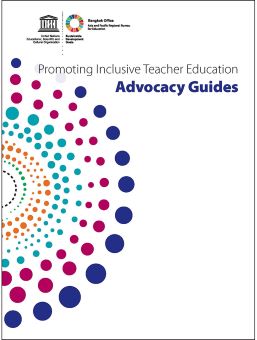Promoting Inclusive Teacher Education Series

Target groups: teacher education institutions, ministries of education and other key education stakeholders to support the adaptation, development, and implementation of inclusive policies, inclusive curricula, inclusive teaching/learning materials and inclusive teaching methodologies.
Promoting Inclusive Teacher Education’ is a series of five advocacy guides. The guides discuss challenges and barriers to inclusive education in different areas of teacher education and offer related strategies and solutions for effective advocacy towards more inclusive practices. The series begins with this introductory guide. It provides an overview of inclusive teacher education and of what advocacy means in this context. It also provides an introduction to the topics covered in the four other guides in the series. These are ‘Policy’, ‘Curriculum’, ‘Materials’, and ‘Methodology’.
These advocacy guides are for anyone who wants to do advocacy to bring about improvements in pre‑service teacher education towards more inclusive education. Advocates on this issue might include:ypolicy‑makers – who may be advocating for greater support and guidance within the government for teacher education reform; and/or advocating for teacher education institutions to embrace new ideas, reform their practices, or implement new policiesyheads of teacher education institutions – who may want to lobby the government for policy change on teacher education and/or for support in reforming teacher education practices in the institutions; and/or who may want to do ‘internal advocacy’ to encourage more teacher educators to support change in the teacher education systemyteacher educators – who may want to convince their teacher education institution directors (or colleagues) of the need for change; and/or who may want to join in a call for change at government policy levelyinternational NGO and agency staff – who may want to directly lobby the government for teacher education reform; and/or support other stakeholders to call for and implement changesyteachers and student teachers – who may want to push for improvements in the pre‑service teacher education that they and their future colleagues receive, so as to better prepare them for the realities of increasingly demanding and diverse classesylearners and their communities – who may want to focus on teacher education as part of their calls for improvements in the way they are educated.